1. Trump Administration Plans to Open U.S. Coastlines to Drilling
 On Thursday the Trump administration announced plans to open "nearly all" U.S. coastlines to oil and gas drilling, "giving energy companies access to leases off California for the first time in decades and opening more than a billion acres in the Arctic and along the Eastern Seaboard." Offshore drilling is opposed by the governors of New Jersey, Delaware, Maryland, Virginia, North Carolina, South Carolina, California, Oregon and Washington, who are concerned that drilling could threaten fishing and tourism. Read More...
On Thursday the Trump administration announced plans to open "nearly all" U.S. coastlines to oil and gas drilling, "giving energy companies access to leases off California for the first time in decades and opening more than a billion acres in the Arctic and along the Eastern Seaboard." Offshore drilling is opposed by the governors of New Jersey, Delaware, Maryland, Virginia, North Carolina, South Carolina, California, Oregon and Washington, who are concerned that drilling could threaten fishing and tourism. Read More... 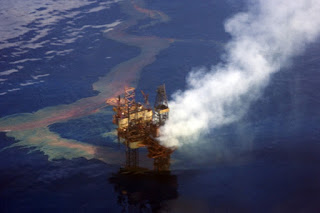 The Trump administration proposes to “rewrite or kill" Obama-era safeguards on offshore oil and gas drilling. These rules were put in place after the disastrous Deepwater Horizon oil spill in the Gulf of Mexico. The administration said the rules are "an unnecessary burden on industry and rolling them back would encourage more energy production.” Environmentalists say the changes would leave U.S. coasts vulnerable to more devastating oil spills.
The Trump administration proposes to “rewrite or kill" Obama-era safeguards on offshore oil and gas drilling. These rules were put in place after the disastrous Deepwater Horizon oil spill in the Gulf of Mexico. The administration said the rules are "an unnecessary burden on industry and rolling them back would encourage more energy production.” Environmentalists say the changes would leave U.S. coasts vulnerable to more devastating oil spills.---------------------------------------------------
3. Frozen Sharks Found on Beach During US East Coast Freeze
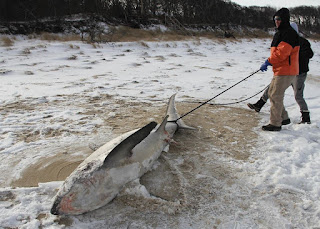 Four frozen thresher sharks have washed ashore in Cape Cod during an Arctic freeze hitting the area this week. They didn’t freeze in the water but froze after being washed ashore. “It's likely that the colder temperatures triggered a rapid migration south, and that some sharks got trapped in Cape Cod Bay and washed ashore. Turtles and some fish also get stranded on the shores of Cape Cod Bay during winter months,” according to Greg Skomal, senior marine fisheries scientist at Massachusetts Marine Fisheries.
Four frozen thresher sharks have washed ashore in Cape Cod during an Arctic freeze hitting the area this week. They didn’t freeze in the water but froze after being washed ashore. “It's likely that the colder temperatures triggered a rapid migration south, and that some sharks got trapped in Cape Cod Bay and washed ashore. Turtles and some fish also get stranded on the shores of Cape Cod Bay during winter months,” according to Greg Skomal, senior marine fisheries scientist at Massachusetts Marine Fisheries. -----------------------------------------------
4. Will Jellyfish Take Over the Oceans?
 In this Atlantic article, find out if jellies will indeed take over the changing oceans. “Their delicacy notwithstanding, in recent decades jellyfish species have come to be thought of as the durable and opportunistic inheritors of our imperiled seas. Jellyfish blooms—the intermittent, and now widely reported, flourishing of vast swarms—are held by many to augur the depletion of marine biomes. They are seen as a signal that the oceans have been overwarmed, overfished, acidified, and befouled.”
In this Atlantic article, find out if jellies will indeed take over the changing oceans. “Their delicacy notwithstanding, in recent decades jellyfish species have come to be thought of as the durable and opportunistic inheritors of our imperiled seas. Jellyfish blooms—the intermittent, and now widely reported, flourishing of vast swarms—are held by many to augur the depletion of marine biomes. They are seen as a signal that the oceans have been overwarmed, overfished, acidified, and befouled.”-----------------------------------------------
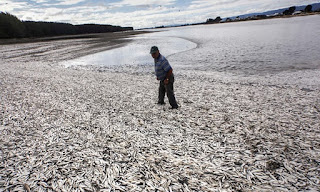 Like a plot out of a bad horror film, "dead zones" are spreading across the world's oceans. "At least 500 of these dead zones have now been reported near coasts, up from fewer than 50 and 1950." Few sea creatures can survive in these zones, triggered by coastal runoff and made worse by climate change, because a warmer ocean holds less oxygen. That's bad news for all of us: microbes the growing dead zones produce nitrous oxide, a greenhouse gas 300 times more potent than carbon dioxide.
Like a plot out of a bad horror film, "dead zones" are spreading across the world's oceans. "At least 500 of these dead zones have now been reported near coasts, up from fewer than 50 and 1950." Few sea creatures can survive in these zones, triggered by coastal runoff and made worse by climate change, because a warmer ocean holds less oxygen. That's bad news for all of us: microbes the growing dead zones produce nitrous oxide, a greenhouse gas 300 times more potent than carbon dioxide.
-----------------------------------------------
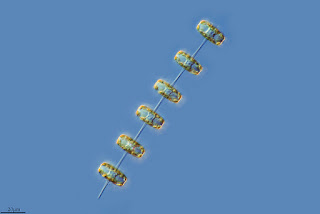
-----------------------------------------------
7. Rare Intersex Shark Found Off Taiwan Coast
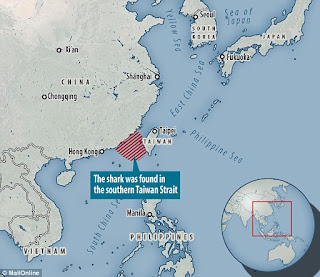 A rare intersex shark, with both male and female reproductive organs, has been found off of Taiwan. The Pacific spadenose shark is only 1.6 feet long and weighs 0.79 pounds. Only a handful of intersex sharks have been found, and none of this species. Unlike some fish species that can change gender, sharks are born permanently with either male or female sex organs. Sharks in captivity have given birth without mating--could intersex sharks be one reason why?
A rare intersex shark, with both male and female reproductive organs, has been found off of Taiwan. The Pacific spadenose shark is only 1.6 feet long and weighs 0.79 pounds. Only a handful of intersex sharks have been found, and none of this species. Unlike some fish species that can change gender, sharks are born permanently with either male or female sex organs. Sharks in captivity have given birth without mating--could intersex sharks be one reason why? -----------------------------------------------
Be sure to "LIKE" http://facebook.com/SeaSave to ensure our "Week in Review" is delivered to your newsfeed every Friday.
Sea Save Foundation is committed to raising awareness of marine conservation. The Week in Review is a team effort produced by the Sea Save staff to provide a weekly summary of the latest in marine research, policy, and news.